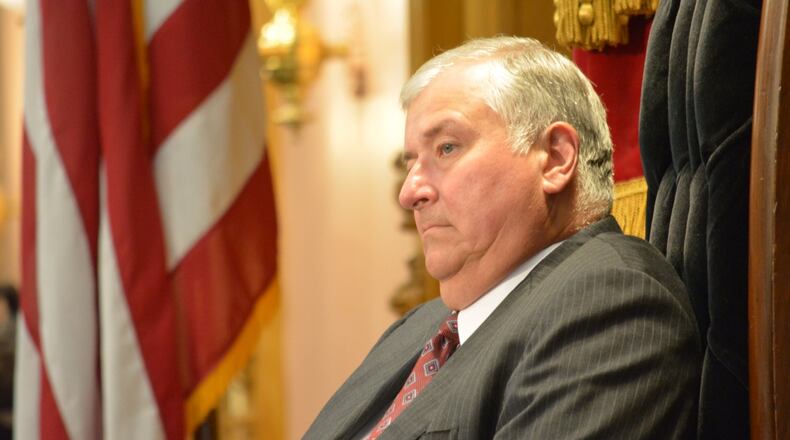A year later, Ohioans for Legislative Term Limits — which multiple sources say Householder backed — proposed a constitutional amendment that would have re-set the clock so that Householder and other current lawmakers could serve 16 more years before being forced out.
The House GOP caucus is scheduled to vote 10 a.m. Thursday on removing Householder as speaker. Householder is accused in U.S. District Court of operating a racketeering scheme that used $60 million in dark money from FirstEnergy to build his power base, win the speakership and deliver a $1.3 billion bailout bill for the Akron-based utility.
Ohio Senate President Larry Obhof, R-Medina, said foundational changes may be merited but shouldn’t be applied to sitting lawmakers. Obhof opposed the proposed term limit amendment at the Ohio Ballot Board in March, arguing that it would double the limits to 16 years and re-set the clock for current legislators who are now serving under eight year limits.
Obhof said this week that Householder “pretty clearly seemed to be the prime beneficiary of it. I don’t think it’s too hard for people to connect the dots here.”
Approved by voters in 1992, term limits allow lawmakers to serve a maximum of eight consecutive years in either chamber. A handful of lawmaker have sidestepped those limits by bouncing back and forth between the House and Senate.
Ohioans for Legislative Term Limits was incorporated Feb. 14, 2020, and submitted amendment language to the Ohio attorney general’s office five days later. The Ohio Ballot Board certified it as a single issue on March 2, clearing the way for the campaign to collect nearly 450,000 valid voter signatures by early July to qualify for the November ballot.
One source who spoke on the condition of anonymity said Householder aide Jeff Longstreth was raising money into Coalition for Term Limits Inc., a 501(c)(4) organization established April 20 by Columbus area attorney Donald Brey. The source said his organization contributed more than $100,000 to the Coalition for Term Limits in April.
Longstreth is also charged with racketeering and is described in an 82-page criminal complaint as Householder’s long-time political strategist.
But the coronavirus crisis severely hampered signature gathering campaigns for statewide ballot issues.
Don McTigue, attorney for Ohioans for Legislative Term Limits, could not be reached for comment. Householder did not respond to a message seeking comment.
In his speech to the House chamber when he was elected speaker in 2019, Householder told his fellow lawmakers: “We have to always remember that the people of Ohio have given this building to all of us as a tool, and how we use this tool is of our own choice.”
The day Householder returned to power as the House speaker he also pledged to appoint a standing subcommittee on energy generation – the group that handled the first hearings on House Bill 6, a $1.3 billion bailout bill.
Householder served in the Ohio House from January 1997 to December 2004 and held the speaker position from 2001 to 2004. In 2004, two leaked memos about Team Householder triggered a two-year federal investigation that closed in 2006 without charges.
He returned to the Ohio House in January 2017. Two years later, Democrats and Republicans in the chamber picked him to lead the House again.
Householder, who has said he will not resign his seat, is running unopposed for re-election.
If he were to withdraw from the ballot by Aug. 10, the district committee for each party could nominate replacement candidates to be on the ballot, according to the Ohio Secretary of State.
Householder’s criminal defense attorney Dave Thomas did not respond to a message seeking comment about the federal public corruption case.
About the Author

